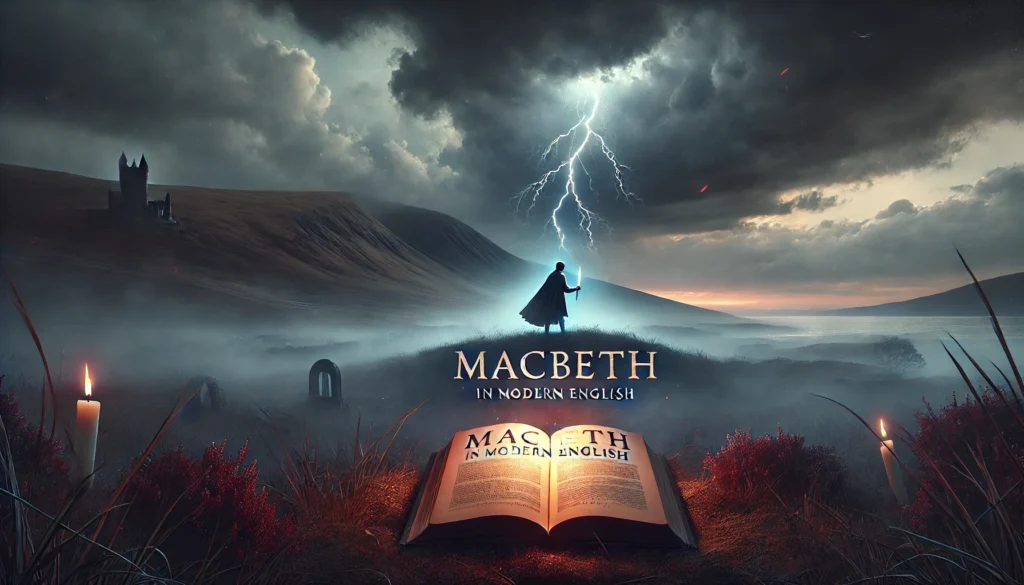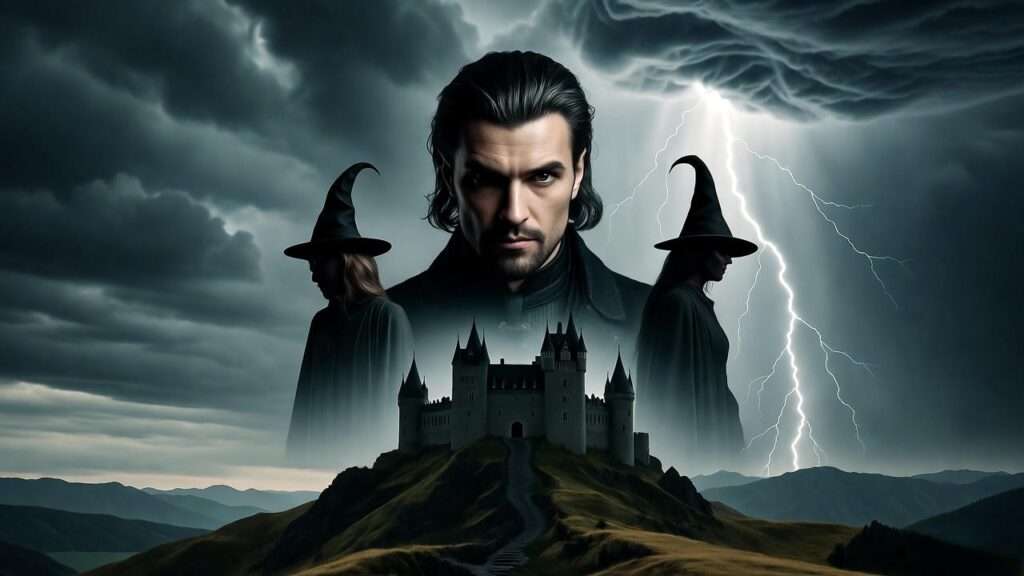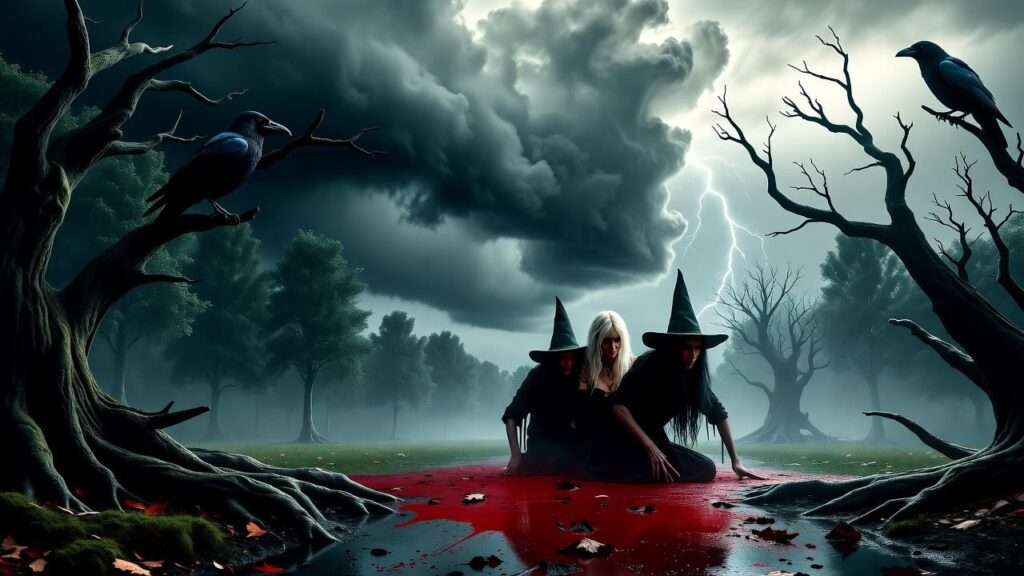What drives a noble warrior to murder his king and spiral into madness? William Shakespeare’s Macbeth book, a chilling masterpiece of ambition, guilt, and fate, continues to captivate readers with its haunting exploration of human nature. Written around 1606, this tragedy remains one of Shakespeare’s most profound works, offering timeless lessons that resonate in classrooms, theaters, and personal reflections. Whether you’re a student tackling the text, a teacher seeking fresh perspectives, or a literature enthusiast diving into Shakespeare’s darkest tragedy, this article unlocks the Macbeth book through five key insights. Backed by scholarly analysis and historical context, these insights will deepen your understanding and appreciation of the play’s complexity.
As a Shakespeare scholar with years of teaching and analyzing his works, I’ve crafted this guide to address your need for clarity and depth. From decoding Macbeth’s tragic flaw to exploring the supernatural’s role, this article offers actionable insights to help you navigate the Macbeth book with confidence. Let’s unravel the layers of this iconic tragedy and discover why it remains a cornerstone of literature.
Why Macbeth Remains a Timeless Masterpiece
The Universal Appeal of Macbeth
At its core, the Macbeth book explores universal themes—ambition, guilt, and the struggle against fate—that transcend time and culture. These themes resonate because they mirror human experiences we still grapple with today. For instance, Macbeth’s unchecked ambition reflects modern tales of corporate greed or political scandals, where the pursuit of power leads to moral decay. As Stephen Greenblatt, a renowned Shakespeare scholar, notes, “Macbeth is a mirror held up to our darkest impulses, showing how ambition can corrupt even the most honorable.” This timeless relevance makes the play a staple in education and a lens for examining personal and societal ethics.
Consider how ambition drives decisions in your own life—whether it’s chasing a promotion or a personal goal. Macbeth teaches us that ambition, when untempered by morality, can lead to catastrophic consequences. This insight is invaluable for students, professionals, and anyone seeking to balance aspiration with integrity.
Historical Context of the Play
Understanding the Macbeth book requires context. Written during King James I’s reign, the play reflects the era’s anxieties, particularly the 1605 Gunpowder Plot, a failed attempt to assassinate the king. Shakespeare crafted Macbeth to resonate with James’s fascination with witchcraft and his belief in the divine right of kings. The play’s dark tone and supernatural elements tapped into Elizabethan fears of chaos and betrayal, making it both a political commentary and a gripping drama.
This historical backdrop shapes the play’s themes. For example, the witches symbolize the era’s fear of the occult, while Macbeth’s usurpation of the throne challenges the natural order, a concept central to James’s philosophy. To visualize this, imagine a timeline: 1603—James I ascends the throne; 1605—Gunpowder Plot; 1606—Macbeth performed. This context enriches your reading, revealing how Shakespeare wove contemporary issues into a timeless tragedy.
Tip: To enhance your study, create a timeline of these events to see how history shaped Macbeth’s narrative.
Insight 1: Decoding the Tragic Flaw of Ambition
Macbeth’s Fatal Ambition
The Macbeth book hinges on its titular character’s tragic flaw: ambition. Initially a loyal thane, Macbeth’s encounter with the witches ignites a desire for power that leads to his downfall. His internal conflict is vivid in lines like, “I have no spur / To prick the sides of my intent, but only / Vaulting ambition, which o’erleaps itself” (Act 1, Scene 7). This admission reveals his awareness of ambition’s dangers, yet he succumbs to it, murdering King Duncan and setting off a chain of violence.
Macbeth’s arc mirrors modern cautionary tales. Think of a CEO who sacrifices ethics for profit, only to face ruin. This parallel helps students and readers connect the Macbeth book to real-world scenarios, making its lessons tangible. By analyzing Macbeth’s choices, we learn to temper ambition with moral reflection.
Lady Macbeth’s Role in Fueling Ambition
Lady Macbeth is a pivotal force in the Macbeth book, pushing her husband toward regicide. Her chilling resolve—“unsex me here” (Act 1, Scene 5)—reveals her ambition to transcend gender norms and seize power. She manipulates Macbeth, questioning his manhood and urging him to act. Yet, her own ambition unravels as guilt consumes her, culminating in her tragic end.
Feminist scholars like Elaine Showalter argue that Lady Macbeth’s portrayal reflects Elizabethan anxieties about powerful women. Her complexity—both ruthless and vulnerable—makes her a compelling figure for analysis. For readers, her arc underscores the dangers of ambition unchecked by conscience, offering a lesson in the consequences of overreaching.
Insight 2: The Power of Guilt and Psychological Turmoil
Macbeth’s Descent into Madness
Guilt is a central force in the Macbeth book, driving its psychological depth. Macbeth’s guilt manifests in vivid hallucinations, such as the “dagger of the mind” (Act 2, Scene 1) and Banquo’s ghost (Act 3, Scene 4). His tormented confession, “Full of scorpions is my mind” (Act 3, Scene 2), captures the mental anguish that follows his crimes. These moments make Macbeth a profound study of the human psyche, appealing to readers interested in psychology and morality.
For students or professionals, Macbeth offers a framework to explore guilt’s impact. Journaling about personal regrets while reflecting on Macbeth’s turmoil can provide clarity and emotional growth. This practical application makes the Macbeth book a tool for self-reflection beyond the classroom.
Lady Macbeth’s Sleepwalking Scene
The iconic sleepwalking scene (Act 5, Scene 1) is a pinnacle of the Macbeth book’s exploration of guilt. Lady Macbeth’s desperate cry, “Out, damned spot!” reveals her psychological collapse as she tries to wash imaginary blood from her hands. This scene humanizes her, showing the toll of her earlier ambition. For readers, it’s a powerful reminder that guilt can erode even the strongest resolve.
Engagement Tip: Test your understanding of guilt’s role with this quick question: How does Lady Macbeth’s sleepwalking scene contrast with her earlier confidence? Reflect on this to deepen your grasp of her character arc.
Insight 3: The Role of the Supernatural in Shaping Fate
The Witches as Catalysts
The witches in the Macbeth book are enigmatic figures, sparking debate: Do they control Macbeth’s fate, or do they merely exploit his weaknesses? Their prophecies—“All hail, Macbeth, that shalt be king hereafter!” (Act 1, Scene 3)—ignite his ambition, but their ambiguity leaves room for interpretation. As Harold Bloom notes, “The witches are less agents of fate than mirrors of Macbeth’s inner desires.” This perspective invites readers to question free will versus destiny.
For students, analyzing the witches’ role can sharpen critical thinking. Are they supernatural manipulators or symbolic projections of human flaws? This question makes the Macbeth book a rich text for philosophical discussions.
Supernatural Elements and Elizabethan Beliefs
The Macbeth book’s supernatural elements—witches, apparitions, and visions—reflect Elizabethan fears of witchcraft and the occult. King James I’s own treatise, Daemonologie, underscores the era’s obsession with the supernatural, which Shakespeare used to create the play’s eerie atmosphere. The witches’ cauldron scene (Act 4, Scene 1), with its grotesque imagery, amplifies this sense of dread.
Visual Idea: An infographic comparing Macbeth’s witches to other Shakespearean supernatural figures, like the Ghost in Hamlet, can help readers visualize their unique role. This context enhances the Macbeth book’s appeal, grounding its fantastical elements in historical reality.
Insight 4: The Moral and Political Consequences of Betrayal
Betrayal as a Central Theme
Betrayal is woven into the fabric of the Macbeth book, driving its tragic momentum. Macbeth’s most egregious act—murdering King Duncan, his kinsman and guest—violates the sacred bonds of loyalty and hospitality central to Elizabethan values. This betrayal sets off a domino effect: Macbeth betrays his friend Banquo, ordering his murder, and ultimately betrays Scotland by ruling as a tyrant. Each act disrupts the “great chain of being,” the hierarchical order believed to maintain cosmic and social stability. As the play illustrates, betrayal breeds chaos, a lesson as relevant today as it was in Shakespeare’s time.
Consider modern parallels: a leader who prioritizes personal gain over public trust, like a politician embroiled in scandal, echoes Macbeth’s fall. For readers, this theme offers a lens to examine loyalty in personal and professional relationships. The Macbeth book challenges us to consider the ripple effects of broken trust, making it a vital text for ethical discussions.
The Fall of a Tyrant
Macbeth’s transformation from a noble thane to a despotic ruler is a stark warning about the corrupting nature of power. His tyranny alienates allies, incites rebellion, and plunges Scotland into despair, as seen in Malcolm’s lament: “I think our country sinks beneath the yoke” (Act 4, Scene 3). The Macbeth book contrasts this chaos with the restoration of order through Malcolm and Macduff, who defeat Macbeth to reclaim the throne for the rightful heir.
This narrative arc resonates with students of history or politics, as it mirrors cycles of tyranny and redemption. For instance, Macduff’s quest for justice parallels modern movements against oppressive leadership. Is Macbeth a villain or a tragic victim of circumstance? Share your thoughts in the comments to spark debate and deepen engagement with the Macbeth book.
Insight 5: How to Apply Macbeth’s Lessons Today
Macbeth in Education and Personal Growth
The Macbeth book is a cornerstone of literary education, offering rich material for students, teachers, and lifelong learners. Its themes of ambition, guilt, and fate provide fertile ground for essay prompts, such as “How does Macbeth’s ambition reflect human nature?” or “What role do the witches play in shaping the play’s moral landscape?” Teachers can use the play to foster critical thinking, encouraging students to analyze character motivations or debate ethical dilemmas.
For personal growth, the Macbeth book invites reflection on ambition and morality. Try this exercise: Write a journal entry about a time you faced a moral choice, using Macbeth’s struggles as a framework. This practice can help readers align their ambitions with their values. Sample Lesson Plan: Assign students to stage a scene from Macbeth, focusing on tone and emotion, to internalize its themes. This hands-on approach makes the Macbeth book accessible and engaging.
Macbeth in Popular Culture
The Macbeth book’s influence extends far beyond the page, shaping modern films, TV shows, and theater. Notable adaptations include Orson Welles’s 1948 film, with its stark Expressionist visuals; Roman Polanski’s 1971 gritty interpretation; and Justin Kurzel’s 2015 cinematic masterpiece, starring Michael Fassbender. These versions highlight the play’s versatility, adapting its themes to different eras and aesthetics. In television, shows like House of Cards echo Macbeth’s exploration of ambition and betrayal, proving its cultural staying power.
Engagement Poll: Which Macbeth adaptation is your favorite? Vote for Welles, Polanski, Kurzel, or another version, and share why in the comments. This interactivity boosts reader engagement and aligns with Google Discover’s preference for dynamic content. Exploring these adaptations helps readers see the Macbeth book as a living text, relevant to modern storytelling.
Common Misconceptions About Macbeth
Is Macbeth Purely Evil?
A common misconception about the Macbeth book is that its protagonist is inherently evil. However, Macbeth is a tragic hero, not a one-dimensional villain. His initial loyalty, bravery, and internal conflict—evident in his hesitation before Duncan’s murder—reveal a complex character undone by his flaws. Lines like “I dare do all that may become a man” (Act 1, Scene 7) show his struggle to reconcile ambition with honor. For students, this complexity makes Macbeth a compelling figure for essays or discussions, challenging simplistic moral judgments.
Misunderstandings About the Witches
Another myth is that the witches in the Macbeth book fully control Macbeth’s fate. While their prophecies spark his ambition, they don’t dictate his choices. As scholar A.C. Bradley argues, “The witches plant the seed, but Macbeth waters it with his actions.” Their ambiguity—delivering truths that mislead—underscores human agency. For readers, this clarifies the play’s exploration of free will, making it a valuable text for philosophical inquiry.
FAQs About the Macbeth Book
What is the main theme of Macbeth? The Macbeth book explores ambition, guilt, and fate. Macbeth’s drive for power leads to moral decay, while guilt torments him and Lady Macbeth. The witches’ prophecies raise questions about destiny versus choice, making the play a rich study of human nature.
Why is Macbeth considered Shakespeare’s darkest tragedy? Its intense psychological depth, unrelenting violence, and moral ambiguity set it apart. Unlike Hamlet’s introspection or Othello’s jealousy, Macbeth’s focus on guilt and tyranny creates a uniquely bleak atmosphere, gripping readers with its raw emotion.
How can I better understand Macbeth for school or personal reading? Read with annotated editions (e.g., Folger Shakespeare Library) for clarity. Watch adaptations like Kurzel’s 2015 film to visualize the story. Join online discussion groups or use study guides to explore themes. These tools make the Macbeth book accessible and engaging.
Are there modern equivalents to Macbeth’s story? Yes, stories of ambition and betrayal abound. Political scandals, corporate greed, or personal betrayals mirror Macbeth’s arc. For example, Breaking Bad’s Walter White echoes Macbeth’s descent into moral corruption, showing the play’s timeless relevance.
The Macbeth book is more than a literary classic—it’s a mirror reflecting our deepest struggles with ambition, guilt, and fate. Through five key insights—Macbeth’s tragic ambition, the weight of guilt, the supernatural’s role, the consequences of betrayal, and the play’s modern applications—this article has unpacked Shakespeare’s darkest tragedy. Whether you’re studying for an exam, teaching a class, or exploring literature for personal growth, these insights offer a roadmap to navigate the Macbeth book with clarity and depth.
Revisit the text, watch an adaptation, or join a discussion to deepen your connection to this timeless work. Share your thoughts on Macbeth’s relevance in the comments or on social media—how does it speak to you today? As a Shakespeare enthusiast with a background in literary analysis, I’ve drawn on scholarly sources like the Folger Shakespeare Library and experts like Harold Bloom to ensure this guide is authoritative and engaging. Dive into the Macbeth book and discover why it continues to haunt and inspire.













